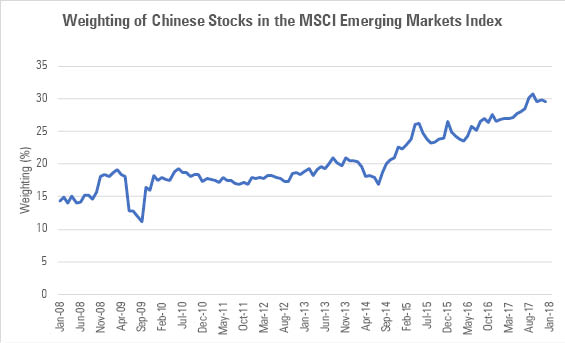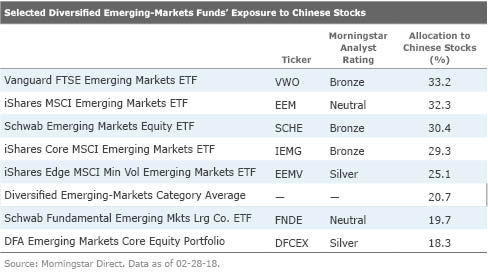Market-Cap-Weighting Dials Up Country Concentration in Emerging Markets
Emerging-markets index-tracking funds hold large stakes in Chinese stocks.
Low-cost, broadly diversified, index-tracking funds have historically produced outstanding outcomes for investors. Many of these funds across various Morningstar Categories receive our highest Morningstar Analyst Ratings, as we expect they will continue to deliver superior risk-adjusted outcomes. At present, the application of a market-cap-weighted approach to emerging markets results in a quirk. All of these cap-weighted index trackers have roughly one third of their assets parked in stocks from China, which disrupts their geographic diversification. As a result, low-cost, cap-weighted emerging-markets funds from Vanguard, iShares, and Schwab all carry Bronze ratings--an indication that we still have a favorable of view these strategies but have less confidence in their ability to perform well against their peers.
A bias toward China, or any country for that matter, ties a larger portion of these funds to stocks from a single region and denominated in a single currency. But there are a few funds in the emerging-markets category that stand out for controlling this country/currency concentration or take a long-term focus on reducing risk.
The Rise of China Market-cap-weighted strategies, by design, don't impose any limits on country or sector weightings. But the importance of geographic diversification in emerging-markets stock funds cannot be understated. Certain market segments can, on occasion, grow so large that they begin to intrude on a fund's diversification potential. Such a scenario has played out before. Japanese stocks dominated market indexes like the MSCI EAFE in the 1980s. Consequently, the performance of this index suffered when the Japanese market crashed in the early 1990s.
Chinese stocks are the current culprits in emerging markets, as they have been consuming a growing share of this universe. In January 2008, Chinese stocks accounted for 14.4% of the MSCI Emerging Markets Index. By December 2017 that figure had more than doubled to 29.5%. The performance of the Chinese market over that decade was part of the reason for this expansion. The MSCI China Index returned 3.0% annually compared with 1.2% for the MSCI Emerging Markets ex China Index over this span. The number of Chinese stocks represented in the benchmark also grew over those 10 years from 110 to 151.

Source: Morningstar Direct.
What makes the case of China different from Japan is that a decent chunk of the opportunity set--most notably China A-shares--has been largely inaccessible to foreign investors. But this has been changing during the past several years. Investors outside of China are slowly gaining access to more of these locally traded companies through a relaxing of the Qualified Foreign Institutional Investor (QFII) quota, as well as the addition of China A-shares to a growing number of indexes. For example,
For the foreseeable future, it is likely that most broad, market-cap-weighted emerging-markets indexes will have sizable allocations to Chinese stocks. Just how much Chinese stocks' representation in these benchmarks expands (or, potentially contracts) depends on the future growth of the Chinese market and the degree to which China A-shares are included in these funds' bogies. Both have been moving in a direction that suggests emerging-markets stock indexes will continue to increase their concentration in China. The table below features the allocation to Chinese stocks among certain index-trackers (and one DFA fund) in the diversified emerging-markets category as of February 2018.

What's the Solution?
The most straightforward and simple fix for this growing issue is already being used by some non-index-tracking funds: simply cap country/currency exposure directly. Maintaining geographic diversification is one area where not rigidly tracking an index may prove beneficial. A case in point would be
But DFA's funds aren't widely available, with distribution limited to approved advisors and certain retirement accounts like 401(k)s. Strategic-beta funds like
Alternatively,
Market-cap weighting has some drawbacks in the universe of emerging-markets stocks. Most notably, the approach currently results in significant country-level concentration. That said, there are some funds that provide broad exposure to emerging markets while also either directly or indirectly limiting their concentration to any one country. Certain strategies, like fundamental weighting, can accomplish this, but also capture a lot of other risks in doing so that make them less attractive overall. Scaling back on risk more broadly, with a low-volatility strategy, appears to be a compelling alternative.

/s3.amazonaws.com/arc-authors/morningstar/78665e5a-2da4-4dff-bdfd-3d8248d5ae4d.jpg)
/cloudfront-us-east-1.images.arcpublishing.com/morningstar/T2LGZCEHBZBJJPPKHO7Y4EEKSM.png)
/d10o6nnig0wrdw.cloudfront.net/04-18-2024/t_34ccafe52c7c46979f1073e515ef92d4_name_file_960x540_1600_v4_.jpg)
/d10o6nnig0wrdw.cloudfront.net/04-09-2024/t_e87d9a06e6904d6f97765a0784117913_name_file_960x540_1600_v4_.jpg)
:quality(80)/s3.amazonaws.com/arc-authors/morningstar/78665e5a-2da4-4dff-bdfd-3d8248d5ae4d.jpg)